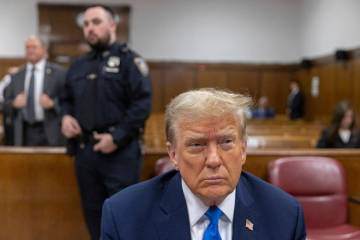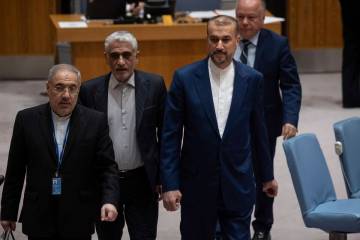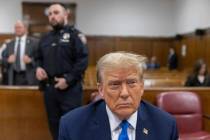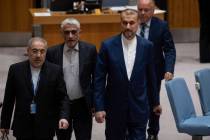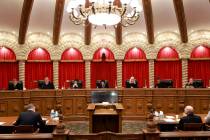UNLV says outreach unit fixed
Three years after a damning internal audit of its educational outreach department, the University of Nevada, Las Vegas has no written record of what steps were taken to correct serious flaws the audit exposed.
Yet a budget officer who complained about such problems, two years before the audit, was frozen out of her job and given a "not rehirable" reference by her former boss.
Instead of responding normally to the audit, UNLV officials used an informal process, and claim that process made documentation unnecessary. Auditing experts said the informal procedure is unusual and not a best practice.
One key remedy was not taken until after the May death of Richard Lee, the vice provost who oversaw the outreach department at the time it was audited in 2006.
The failure to follow up came to the Review-Journal's attention when it investigated a former employee's claim that she was forced from her job for blowing the whistle on the slipshod accounting.
Leslie Blasco was the outreach department's budget officer. Although she resigned "voluntarily," some former co-workers, while asking to remain anonymous, confirmed that Blasco was isolated by her superiors after trying to impose fiscal order.
"She was right in the things she was saying," said one of the co-workers.
"There basically weren't any set procedures," said another.
Blasco resigned in July 2005. Despite two master's degrees, an earlier history of well-paid jobs, and a then-robust economy, Blasco has been intermittently employed ever since, rarely able to earn more than $10 to $15 per hour.
In November 2005 Blasco's lawyer asked UNLV's then-president, Carol Harter, to make Lee quit responding to employment verification inquiries with the opinion that Blasco was "not rehirable" at UNLV.
UNLV responded with a letter denying Lee had ever done so, and threatening to sue Blasco if she publicly asserted superiors at UNLV had mistreated her. However, documentation obtained by the Review-Journal indicates the denial is untrue; Lee had indeed called her "not rehirable."
The following year, UNLV's own internal audit showed that Blasco's complaints about accounting practices were well-founded.
Its "brief summary" of problems ran three single-spaced pages of such specifics as: "There is a significant lack of oversight of the cash control function ..." and "Supporting documentation for disbursements was often nonexistent."
The audit found that the department intended to renew a $365,000 contract with one vendor, even though it appeared the vendor had produced no significant work.
Heriot Prentice, director of standards and guidance at the Institute of Internal Auditors, said he is not allowed to comment on any specific audit, but described what normally happens after an audit finds problems.
"Management should reply what he is going to do. ... You would expect to see ... a record that the policies were implemented, and an implementation date, and who had the responsibility to carry them out. ... You would normally do a follow-up audit to assure that the remedies are in place and actually being followed."
The UNLV audit report, prepared by Rhett Vertrees, now an associate vice president at UNLV, asked the outreach department to respond to the audit within 60 days. No written response ever came.
Instead, Vertrees said recently, "We went in and helped them set up things as we recommended. ... We let them respond if they want to, but they don't have to."
For an internal auditor to help implement his own recommendations is not unprecedented, said Prentice, but even in that case, a record is normally kept, and a follow-up audit done.
"If the recommendations were about financial procedures, the follow-up should focus on the specific recommendations," Prentice said.
Both Vertrees and UNLV president Neil Smatresk said a state audit of the department, completed this year, constitutes a follow-up audit and proves the problems of 2006 have been remedied. But the state audit, while it found few serious problems, does not address the important recommendations of the 2006 report.
Richard Lee, vice provost of the educational outreach division, died unexpectedly in May after what was supposed to be a relatively safe medical procedure. Smatresk was not yet president of UNLV when Lee died, but the outreach division was already under his authority, and he asked Vertrees to take another informal look at it. Smatresk said that's standard procedure when any top official departs. This time, Vertrees recommended a key change in awarding grants and contracts.
Vertrees explained, "The way they were doing things, the principal investigator, that is, the person who awards the contract, was also responsible for deliverables -- making sure the contractor did what the contract called for, so they could be paid. We said that should be done by two different persons."
But contractors being paid without clearly delivering goods was a central issue of the 2006 audit. So why was this obvious step taken only now?
Smatresk responded, "In every big organization you get drift. There aren't enough bodies to fill the positions, things get done ad hoc, and then you discover it and make sure it is done in a more professional basis."
Smatresk appointed Margaret Rees, executive director of the university's Public Lands Institute, interim vice provost over the outreach division, pending a search and permanent hire.
The 2006 audit was requested by Dawn Neuman, vice provost for academic resources. She had formerly been vice provost of the outreach division, and Rees characterized the 2006 audit as a routine step taken because Neuman turned over the outreach division to Richard Lee on July 1, 2004. However, the audit was not done until 2006, and covered fiscal years 2004 and 2005 -- one year of Neuman's own tenure but also one year of her successor's.
The real reason for the audit, it was reported in 2006, lay in rivalry that developed between educational outreach and the Institute for Security Studies, another UNLV entity. Both wished to do projects related to military and homeland security, and they initially cooperated on some. In fact, a three-cornered arrangement between the two UNLV departments and a Henderson business named Qualifying for Success drew especially harsh criticism in the audit.
Its results were announced at the height of a controversy surrounding the Institute for Security Studies, following investigative stories by Jeff German of the Las Vegas Sun, which showed that ISS had accomplished little with millions of dollars poured into its operations.
The institute operated under the UNLV Research Foundation, a public/private organization not directly accountable to UNLV. Following the controversy, ISS was brought under university control and, in 2008, was placed in the educational outreach division, on the same organizational level as the outreach department.
Both now answer to Rees, who described the move as "part of a broad effort to consolidate our academic/research activities within the University proper, and to redirect the UNLVRF primarily toward development of the research park and other real estate projects in support of UNLV."
Asked exactly what was done, and when, to remedy each problematic practice noted in the 2006 audit, Rees generalized, saying accounting practices are now those followed in the rest of the university. An important specific: Grants are now processed through the university Office of Sponsored Programs, which is supposed to make sure contracts clearly describe expectations and criteria by which they will be deemed fulfilled.
All other recommendations must have been accomplished by July 1, 2006, Rees said, or the same problems would have been discovered in the state's later audit.
But if she has no record what has been done, and who did it, how does a supervisor know those corrective functions are still being carried out?
Rees responded, "Let's suppose you do have such a record. In that case also, how do you know those functions are being carried out?"
Contact A.D. Hopkins at adhopkins@reviewjournal.com or 702-383-0270.





